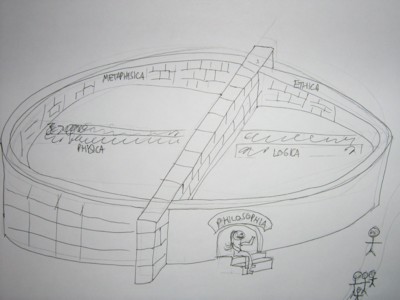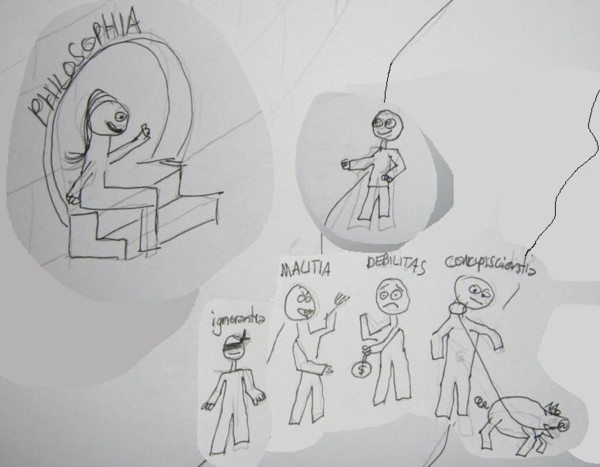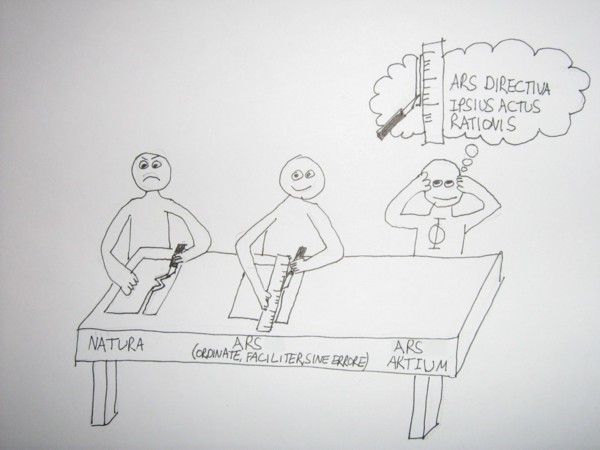
Let's Adore Jesus-Eucharist! | Home >> Philosophy
Philosophy is difficult to teach, among others because it is rather abstract. In order to facilitate the task of philosophy teachers, I try here to come up with some simple annotated drawings. Ideally, I'd like to explain, using drawings, all of the important concepts of the Précis de philosophie by François-Joseph Thonnard. It's a huge task, which could take years!
(I can't draw, so this page is also a "work dispatch page" for real artists. I provide the rough sketch and explanations, and they gradually replace my monstrosities with real drawings. See also: "Job Offer" For An Illustrator.)

When all the drawings will be finished, we'll paste them all together to make a huge fresco, the "Garden of Philosophy". This huge Garden is surrounded by a wall shaped like the Greek letter "Phi": (as in "Phi-losophy", of course!)
This garden is divided inside by low hedges, which form four parts, corresponding to the divisions of Philosophy: Logica, Physica, Metaphysica, Ethica.

At the entrance of the Garden, there is a pretty damsel, personifying Wisdom, which invites all passers-by to come in.
Resplendent and unfading is Wisdom, and she is readily perceived by those
who love her, and found by those who seek her. [...] he who watches for her
at dawn shall not be disappointed, for he shall find her sitting by his gate.
[... She] graciously appears to them in the ways, and meets them with all
solicitude
[Wisdom 6:12-16]
Along the road which passes in front of the entrance to Philosophy, we can see passers-by. One person is stopped, and seems to be interested by Philosophy. Farther down the road, we see four persons who are totally uninterested in Philosophy. These four are called Ignorantia, Malitia, Debilitas, and Concupiscientia (the four wounds of Original Sin).
Ignorantia (ignorance, the opposite of the virtue of Prudence), is blindfolded, and tries to feel her way forward. Malitia (malice or evil, the opposite of the virtue of Justice) is snarling, brandishing a fork in one hand, and reaching for Debilitas' purse with the other. Debilitas (weakness, the opposite of the virtue of Courage) looks terrorized by Malitia (even though he's armed only with a silly fork), and is handing him all of his money rather than resisting the aggression. Concupiscientia (concupiscience, the opposite of the virtue of Temperance) is bent down toward the ground, with a leash around his neck, and he is pulled along by a pig holding the leash in its mouth.

The definition of Logic:
Ars directiva ipsius actus rationis, per quam scilicet homo in ipso actu rationis ordinate, faciliter et sine errore procedat.
The first person just has natural abilities. The second person also has technique ("ars" in Latin), so not only can he cut straight, but he can do so with order, facility and without errors.
The third person has the technique of techniques ("ars artium"), i.e. Logic. This is the technique to direct our "ultimate tool" (our reason).
A.1) All captions in Latin, to avoid having different English and French versions.
Let's Adore Jesus-Eucharist! | Home >> Philosophy